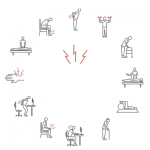To the extent we have not adequately done so, we have not been fair stewards to the very patients that we have dedicated our lives to serving. We should do a better public-relations (PR) job on our patients’ behalf, and also on our profession’s behalf. Indeed, the better the job of PR we do for our patients, the more prominent our standing as a profession becomes in society—a win–win proposition.
Language Lacks Impact
Standard rheumatology terms such as “inflammatory,” “erosive,” or even “rheumatoid,” add very little special meaning or understanding to the average patient’s concept of arthritis. People tend to associate “inflammatory” with infection, and “erosive” more commonly with corrosive, as in wear-and-tear arthritis. And while it is a major medical decision for the rheumatologist to classify a patient as “rheumatoid,” to many patients, the term still sounds like “rheumatism” and not what they want—or expect—to hear.
Indeed, after explaining to a recent patient that he did have RA, I was chagrined when he looked up and said, “I’ve never heard of any arthritis hurting this bad, and now you are telling me it’s incurable. Are you guys trying to keep this stuff a secret, or something?”
Newly diagnosed RA patients don’t want to have a catastrophic diagnosis like cancer, but they do expect whatever is causing their problem to at least garner some measure of understanding and respect from their family and peers. They want to hear an explanation for their suffering that is accountable not just for their misery, but also for their inability to function and to take care of their families and their careers. Their a priori concept of “arthritis” doesn’t fit this bill. To the uninitiated, the term “arthritis,” with or without the “rheumatoid” prefix, seems inadequate and understates their problem.
At the other end of the patient spectrum is the chronic, lifelong, RA patient. I am continually impressed with the fortitude that typical longstanding rheumatoid patients display, year after year. It’s incredible how tolerant and steadfast they become in dealing with their pain and misery. Perhaps they’ve reached the point where they feel that their complaints fall on deaf ears, and this is their dignified manner of dealing with a strange curse that nobody on the outside understands or appreciates.
Thus, both RA groups are frustrated: the new-onset, acute patient is incredulous that such a terrible disease goes unappreciated and unrecognized, and the chronic patients have withdrawn into a shell and a long, endless survival mode. Aside from all the pain, RA can also prove to be quite lonely.


